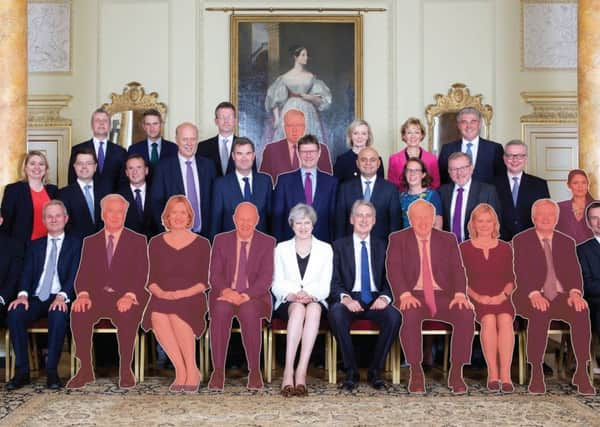Theresa May vows to battle on as Brexit crisis engulfs Cabinet


David Davis and Boris Johnson both quit, issuing scathing attacks on her policy of pursuing a free trade area for goods with the EU after Brexit, with the outgoing foreign secretary claiming it would turn the UK into a “colony”.
With Brexiteers threatening to force a leadership election if she did not abandon her plans, Downing Street insisted the Prime Minister would fight a motion of no confidence.
Advertisement
Hide AdAdvertisement
Hide AdLast night the immediate pressure on the Prime Minister eased after Mrs May told a meeting of the 1922 Committee of Conservative MPs that divisions risked creating the same conditions as before the 1997 Labour landslide.
Despite threats that a third Cabinet secretary would resign to force a leadership challenge unless the Prime Minister backed down, Brexiteers are thought to still be at least a dozen short of the 48 MPs’ letters needed to trigger a vote.
However, Mrs May now faces a further blow if the EU chief negotiator Michel Barnier dismisses the compromise that nearly collapsed the government when he gives Brussels’ first public response to the plans in a speech today.
The government was plunged into one of the deepest political crises in modern British history just before midnight on Sunday, when Mrs May’s Brexit secretary announced he was quitting the government.
Mr Davis had failed to publicly back a compromise struck by the Prime Minister with her Cabinet during a meeting at Chequers that would effectively seek to keep the UK in a customs union with the EU for goods, maintaining a “common rule book” with Brussels and seriously complicating trade deals with the likes of the US. He claimed he had been a “reluctant conscript” to the government’s Brexit negotiating strategy over many months, adding in interviews later the UK was giving “too much away, too easily” in talks with Brussels. Mr Davis was replaced by Dominic Raab, the housing minister who sat on the steering committee of the Vote Leave campaign.
“In my view the inevitable consequence of the proposed policies will be to make the supposed control by Parliament illusory rather than real,” Mr Davis said in his letter. “As I said at Cabinet, the ‘common rule book’ policy hands control of large swathes of our economy to the EU and is certainly not returning control of our laws in any real sense.
“I am also unpersuaded that our negotiating approach will not just lead to further demands for concessions.”
Advertisement
Hide AdAdvertisement
Hide AdThe resignation followed warnings from several Eurosceptic Conservative MPs, including the chairman of the influential European Research Group (ERG) Jacob Rees-Mogg, that they would not vote for a final deal on the terms set out at Chequers, raising doubts over the government’s ability to push through any agreement with Brussels.
Mr Davis was swiftly followed in the small hours of yesterday morning by his deputy, the staunch Brexiteer Steve Baker.
Speaking to the BBC, Mr Baker was scathing of Downing Street’s approach to seeking Cabinet unity on its plans for the UK’s future relationship with the EU, accusing unnamed aides of “childish nonsense”.
Journalists were briefed that ministers who failed to agree to the Prime Minister’s proposals at Chequers would have their ministerial cars withdrawn and would have to ring for a taxi back to London.
Speculation mounted through the day that Mr Johnson would join the exodus after the foreign secretary failed to appear at an EU summit on the Western Balkans that he was supposed to be hosting at Lancaster House in London.
Mr Johnson’s announcement came just half an hour before the Prime Minister was due to update the House of Commons on the unravelling Cabinet deal at Chequers.
He was replaced by Jeremy Hunt, with secretary for digital, culture, media and sport Matt Hancock taking over the health and social care portfolio in the reshuffle.
Jeremy Wright takes on Mr Hancock’s former duties.
Two parliamentary private secretaries, Chris Green and Conor Burns, also resigned
Advertisement
Hide AdAdvertisement
Hide AdIn an even more dramatic resignation letter released last night, the former co-chairman of the official Vote Leave campaign claimed the “dream” of Brexit was “dying, suffocated by needless self-doubt”. Dismissing the Prime Minister’s approach to talks on the future relationship, Mr Johnson said: “It is as though we are sending our vanguard into battle with the white flags fluttering above them.” In her reply, Mrs May said she was “sorry – and a little surprised”.
It is the first time two Cabinet secretaries have quit the government in the same 24-hour period for almost 40 years.
Mr Barnier is expected to respond to the Chequers plan for the first time in a speech on Brexit in New York about 1pm UK time today.
In a warning to both Conservative MPs and the EU, a spokesman for the Prime Minister said there was “no question” of revisiting the Chequers agreement and insisted: “It’s now the EU’s turn to move.”
Standing at the Commons Despatch Box before rows of subdued Conservative MPs, Mrs May defended her plan, saying it was “a Brexit that is in our national interest … it is the right Brexit deal for Britain.”
To laughter and jeers from Labour MPs, she called on the EU to “intensify” negotiations over the summer, adding: “What we are proposing is challenging to the EU, it requires them to think again and look beyond the positions they have taken so far and agree a fair balance of rights and obligations.” Mrs May faced anger from her own MPs, with Peter Bone accusing the government of having “betrayed” Conservative activists, and Martin Vickers warning “frustration is now turning into anger” over the lack of progress on Brexit.